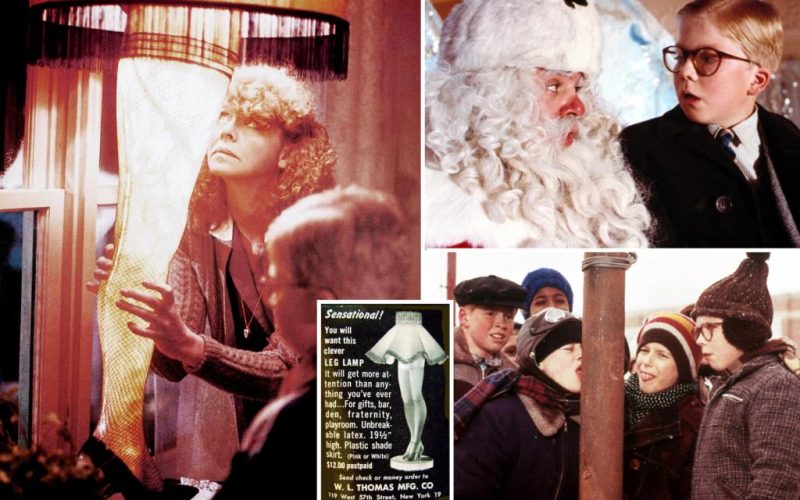We triple-dog-dare you to find a better depiction of the holidays.
When “A Christmas Story” premiered in 1983, screenwriter Jean Shepherd pulled antidotes from his own life to create the Christmas comedy — including the infamous leg lamp.
And Quentin Schultze, the author of “You’ll Shoot Your Eye Out! Life Lessons from the Movie “A Christmas Story,” taught storytelling with Shepherd, leading the pair to become fast friends.
From their time together, Schultze gained a deeper insight into the holiday classic — and it turns out it was a rocky start for the late screenwriter, who died at 78 in 1999.
“Jean Shepherd wrote scripts that he wanted done exactly the way he wrote them,” Schultze exclusively told The Post. “And I have a copy of [the] script the way he wrote it, and it’s almost twice as long as it needs to be for a 90-minute film. So, he was at constant loggerheads with the director, Bob Clark, over this.”
The author continued, “So the stuff is getting cut, and Jean Shepherd is getting angrier and angrier about this and at the same time, at the shooting, Jean is going to the actors and telling them how to deliver their lines in tune with the parables.”
Clark, who died in 2007 at age 67, had eventually had enough.
“Finally, Bob Clark literally kicked him off the set,” Schultze shared. “He said, ‘You cannot be here anymore. I can’t make this film with you hanging around.’ That hurt Jean. But, Jean understood it because he was there telling the characters how to act, including Ralphie [played by Peter Billingsley].”
There was also one scene in particular that got the axe.
“I can think of a lot of the material that Bob Clark took out, both from the script and actually shooting scenes. Whole scenes that they shot that they took out. Including two more dream scenes,” Schultze revealed.
Another interesting twist at the start of making “A Christmas Story” is that Jack Nicholson was originally supposed to be casted.
“The studio wanted Nicholson to play the old man,” Schultze confessed. “And Nicholson was too expensive, this was not a high-budget film, and at the same time, both Jean Shepherd and the director Bob Clark, both of them said, ‘We don’t want Jack Nicholson anyway.’”
And Schultze couldn’t help but agree. “I can’t think of Jack Nicholson having the kind of heartwarming yet curmudgeonly character,” he said. “Maybe he could, but Darren McGavin, it was perfect casting.”
Although the studio said no more than 90 minutes and Clark had to give Shepherd the boot, the life lessons still shined brightly in the film. While writing his book about the Christmas classic, this stuck out to Schultze the most.
“What surprised me the most was how well Shepherd was able to get in the meaning of each life lesson,” he reflected. “If you don’t just look at the movie and what’s happening and what the characters say, but if you pay attention to what the older Ralphie is saying, he gives away the lessons.”
“That was the technique that Jean used because if you say, ‘Well, the meaning of this story is,’ it doesn’t quite work. So you want the story to work on the entertainment level but then to add the overview — line after line.”
Regarding which lines stuck out to Schultze the most, he shared, “Jean has the line about the old man wanting to put the lamp in the window to turn on the neighborhood.
“OK, well, it’s a double meaning. Obviously, you turn on the light. Turn on the neighborhood — that sexual connotation there is extremely important to understand that leg lamp as a trophy wife.”
Shepherd was a master at interweaving themes into the script and characters from his own life.
“The old man in the movie is not real warm and fuzzy with Ralphie,” Schultze emphasized. “He’s not cold, he’s not nasty, he’s not abusive, but he doesn’t call Ralphie by name, and he doesn’t do all kinds of things. He’s kind of distant.”
He shared that this reflected someone in Shepherd’s childhood.
“Jean said to me that, along with the leg lamp, he said, ‘Well Quinn, my old man abandoned us.’ I said, ‘What?’ He said, ‘Yeah, he was never around anyways,’” Schultze began.
“He was always out with women, didn’t come home at night a lot of the time,” Schultze recalled Shepherd saying. “One day, the old man came home from work, and Jean watched while his dad started packing up his suitcase, and his dad said, ‘You’ll understand when you grow up, kid.’ Finishes packing up his suitcase, and Jean watches as his father goes down the front steps of the house and gets in a convertible with his secretary from work and leaves and never comes home. Jean never saw him again.”
That is something that plays into the roles of the old man and Ralphie’s mom.
“When you think about what can shape somebody’s view, for example, the difference between male and female,” Schultze mused, “and his mom had to raise him and take care of everything. I think that single event in his life shaped his view of what men are or can be like more than anything else.”
And with a script written with that much emotion, it’s no surprise that “A Christmas Story” has stood the test of time.
“If you go online and you look at most-watched movies and then you narrow it down by year, what you see is ‘A Christmas Story’ has gone up and up and up,” said Schultze. “Right now, the reports are that between the two cable channels alone that carry it 24 hours, it is up over 50 million American adults seeing it a year, and that’s continuing to go up.”
“I got to know the screenwriter just before the movie came out,” Schultze reflected, “because I wanted to learn how to teach storytelling, and I had heard about him and heard some of his radio shows, and then the film came out, and it bombed at the box office.”
“And I had all these notes from teaching with Shepherd, and I thought, ‘Someday, maybe I’ll write something about this because these parables, it’s these stories that have a deeper meaning.’ But I thought, ‘Nah, the movie’s never going to go anywhere.’ I thought it should but it bombed in the box office.”
But, of course, running it 24 hours a day and the VCR stores stocking the film helped its success.
“It’s all this charm,” Schultze told the Post. “It’s multi-genre, and it’s great characters.”








